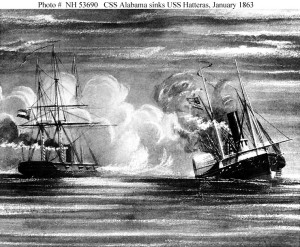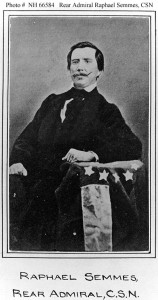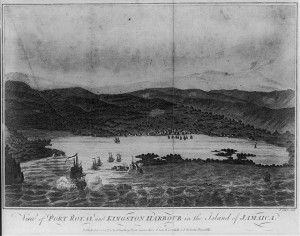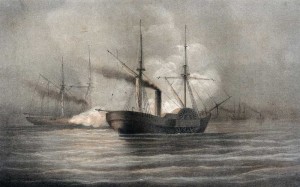1863 has been quite a year so far for John Arnett, a ship’s mate in the Union navy from Seneca Falls, New York. On New Year’s Day his ship, the Westfield, was blown up to prevent capture by the Confederates during the Battle of Galveston. As he closed his January 6th letter he wrote, “I have to report on some vessel, but I do not know which one as yet.” Based on the following report that ship was apparently the USS Hatteras, which joined the squadron off Galveston on January 6, 1863. John was not on board the Hatteras very many days. On January 11, 1863 his ship was sunk by the CSS Alabama during the Action off Galveston Light.
From a Seneca County, New York newspaper in February 1863:
MR. ARNETT has heard from his son JOHN, who was on board the Hatteras during her engagement with the Confederate steamer Alabama. The Hatteras was sunk by the Alabama, and her officers and men taken on board the latter, paroled and landed at Kingston, Jamaica.
The Alabama’s commander Raphael Semmes tells his story of the engagement in Memoirs of Service Afloat, During the War Between the States (page 541 and following). Semmes decided to sail from the Arcas Islands to the coast off Galveston to intercept the expedition of Union General Nathaniel Banks, the “hero of Boston Common”. When Semmes realized he had missed Banks, he decided to lure one of the Union ships away from the squadron and battle it one-on-one. About 20 miles later the fight commenced:
My men handled their pieces with great spirit and commendable coolness, and the action was sharp and exciting while it lasted; which, however, was not very long, for in just thirteen minutes after firing the first gun, the enemy hoisted a light, and fired an off-gun, as a signal that he had been beaten. We at once withheld our fire, and such a cheer went up from the brazen throats of my fellows, as must have astonished even a Texan, if he had heard it. We now steamed up quite close to the beaten steamer, and asked her captain, formally, if he had surrendered. He replied that he had. I then inquired if he was in want of assistance, to which he responded promptly that he was, that his ship was sinking rapidly, and that he needed all our boats.
My first thought was that John Arnett had a rocky start to 1863, but then I remembered we’tre talking about the American Civil War. As John wrote in his January 6th letter, “I lost part of my clothes when the old Westfield went, but I am thankful that I did not lose my head.”




